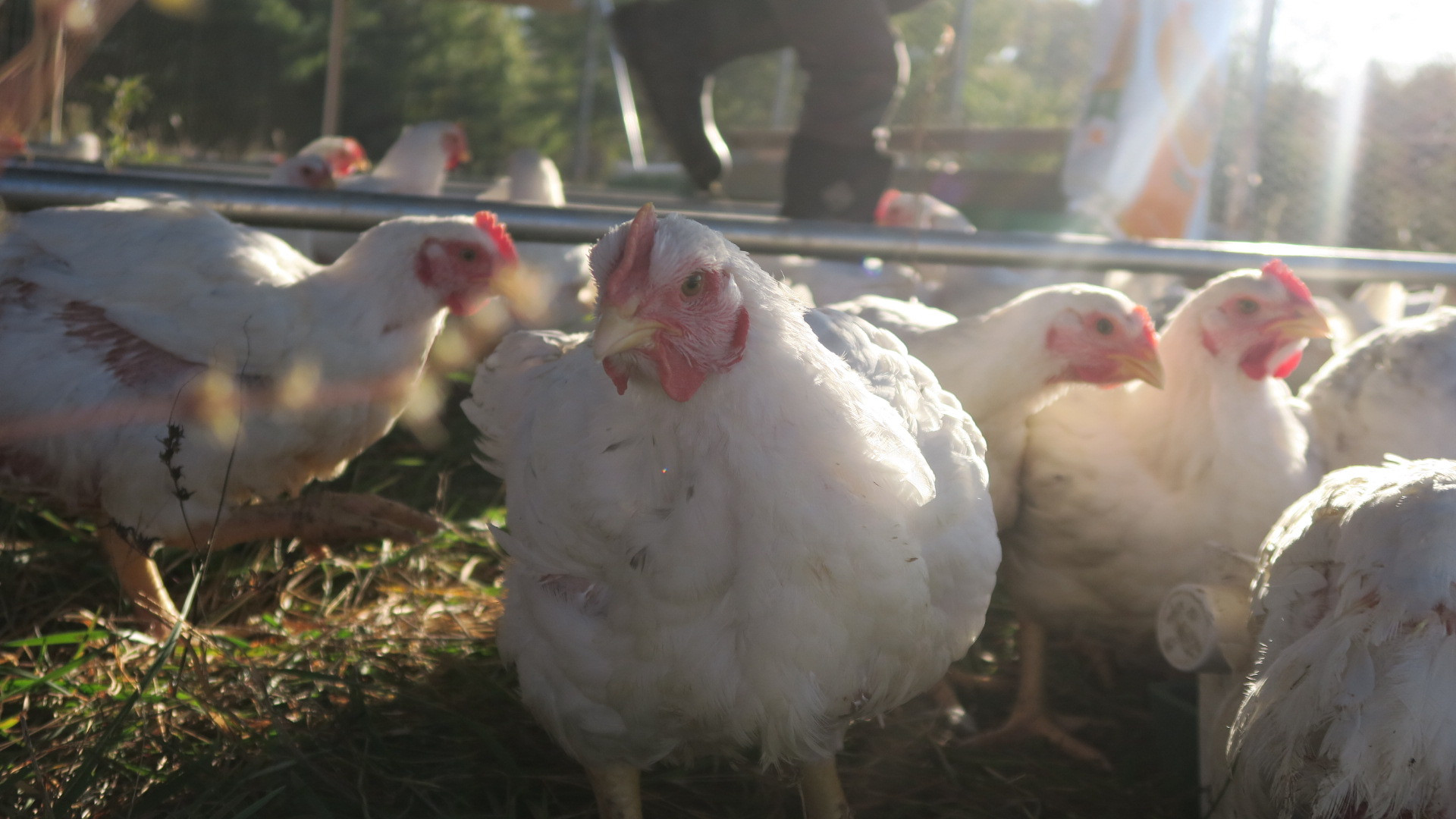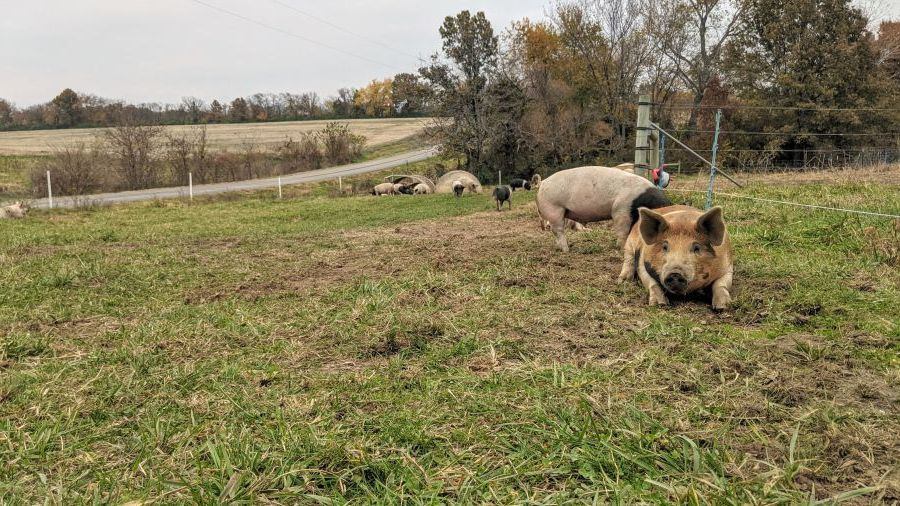How We Raise Your Chicken On Pasture
posted on
June 7, 2023

Hey friends!
Kaitlyn and I believe that our food system should be transparent and contribute to the health of ourselves and our environment.
Through David's Pasture, we work to provide meats for you that are of the highest quality that is affordable. So, today I want to show you how we raise our pasture-raised broiler chickens in a way that accomplishes that.
WHAT IS PASTURE-RAISED CHICKEN?
"Pasture-Raised" is a largely unregulated term that usually refers to livestock or poultry raised outdoors on pasture for a portion of its life. However, not all pasture-raised meats are equal.
While many farms claiming Pasture-Raised are rotating their chickens regularly on green pastures, that is not always the case.
Many companies are now putting Pasture-Raised on their labels as a marketing strategy while raising their chickens on poor-quality pastures without rotation, leading to bare ground that no longer provides a benefit to the chicken.
Pasture-Raised also does not define what other food sources they were supplemented with, meaning a pasture-raised chicken could have been fed GMO grains.
Meanwhile, we cannot put Pasture-Raised on our labels because the USDA will not allow us to do so without expensive and costly measures. 🤦♂️
This is why transparency and consumer accountability are so important! You cannot trust labels to tell you the truth. Farmer-to-eater relationships are the only way to guarantee that you are getting the quality you deserve.
HOW WE RAISE PASTURE-RAISED CHICKEN
At David's Pasture, when we say our chicken is pasture-raised it means three things:
1) They are raised outdoors for the majority of their life.
2) They are raised on green pasture that provides ample bugs and forage.
3) They are regularly moved to maintain their health and that of the soil.
In fact, we move our broiler chickens DAILY in our "Mobile Range Coops", or MRCs for short.

Our Mobile Range Coops are easy-to-move, floorless coops that allow the chickens full access to pasture and insects while keeping them safe from predators and weather.
Every morning while the chickens are on pasture, we pull these forward so the chickens can enjoy a fresh "salad bar." Our coops provide shade to keep them cool and dry and have open sides to provide fresh air and sunlight.
They have access to fresh GMO-free grains with a vitamin and mineral mix to ensure full and healthy development, as well as fresh water from a nearby pond that is free of chemical run-off. We add raw apple cider vinegar and poultry "grit" to their feed or water once a week to support their digestion and gut health. (You can learn about poultry grit here!)
After a full, happy chicken life, we take them to a small, family-run USDA-inspected poultry processor (required by law to sell off-farm.) We have built a relationship with the owners for over a decade now and are glad to have a poultry processor we can trust.
But how do our chickens get their start?

We order chicks from a hatchery in central Iowa, which ships them to us (yes, in the mail) as soon as they hatch. They arrive at our local post office 1-2 days later, and we help them settle into our warm "brooder houses."
Our brooder houses are bedded with peat moss to keep them clean and have propane heaters that keep them at the right temperature for the young chicks. At this age, the chicks only have down feathers and cannot withstand the outdoor elements. But after 2-3 weeks their adult feathers have fully developed and they are ready to go outside!
We carefully move them out to the Mobile Range Coops where they get to spend the rest of their lives in the sunshine doing natural chicken things.

Our turkeys, ducks, and laying hens enjoy a similar lifestyle. Instead of MRCs, we move them in portable "poultry netting." This allows us to give them a larger paddock which we move at least once per week.
THE BENEFITS OF PASTURE-RAISED CHICKEN
Now let's talk about the benefits of raising chickens this way!

1) Pasture-raised chicken improves soil and pasture health.
Chickens are beneficial to the soil in a number of ways. They help to aerate the soil and spread other livestock's manure by scratching and pecking at it, which helps to improve drainage and water infiltration. They scratch and peck because they are hunting for insect eggs and larvae, keeping the bug population in balance. They also add organic matter to the soil in the form of their manure, which improves pasture fertility and water retention. And healthy pasture stops soil erosion. You can see the results plain as day in the photo above. Just look at the improvement of the pasture on the left side where we rotated chickens!
2) Pasture-raised chicken doesn't require antibiotics.
When raising chickens in Concentrated Animal Feeding Operations, also known as "CAFOs", their health declines, and disease runs rampant, requiring the use of antibiotics. But when chickens are raised outside on pasture, they get fresh air and sunlight, eat a healthier diet, and can then develop a strong immune system. We can proudly say that we NEVER give antibiotics to our chickens; it's simply unnecessary.
3) Pasture-raised chicken tastes so much better.
A chicken's diet, care, and environment largely impact the quality of the meat, which is why most store-bought chicken is dry, tough, and lacks flavor. And sadly, people who only eat store-bought chicken don't realize just what they are missing out on.
You've probably realized by now that we farm with a focus on the health of the land and livestock. But what we found along the way is that the flavor and tenderness of our chicken far exceed that of most. Try our pasture-raised chicken and see the difference for yourself. Now that we have been eating our own chicken for over a decade, it's difficult to eat chicken from anywhere else. 😅
Thank you for taking the time to learn how we raise your pasture-raised chicken and the benefits that it provides for the land and you!
If you have any questions please don't hesitate to reach out to us through our contact page.
Until next time!
Your farmer,



